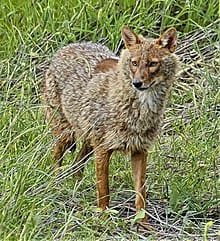Villagers in Bihar Kill Jackal with Sticks and Spears in Fearful Retaliation

Muzaffarpur: In a chilling act of retaliation, villagers in Bihar’s Purushottampur village, Kudhni block, killed a jackal that had terrorised the area for a week. The incident occurred early on Tuesday morning, when the animal attacked a local resident. In a frenzy, villagers armed themselves with sticks and spears, surrounding and beating the jackal to death. The situation escalated when the jackal was later shot. Upon receiving news of the animal’s death, forest officials arrived on the scene and launched an investigation into the killing.
The attack unfolded as some villagers were using outdoor toilets at around 6:30 a.m., when the jackal suddenly lunged from behind. Startled by the commotion, nearby villagers rushed to the scene, and in a coordinated effort, they surrounded the animal and attacked it with makeshift weapons. The jackal, once subdued, was eventually shot dead.
Dr. Rajiv Ranjan, a local veterinarian, reported that the jackal’s carcass was found in a field near Purushottampur Chamrua, a short distance from the road. Upon examination, the animal’s body showed signs of severe trauma, with one leg severed and multiple bruises indicating a violent struggle. “The jackal was incredibly strong,” said Dr. Ranjan. “There were multiple fractures, though it’s uncommon for animals to sustain this level of damage. We are conducting a post-mortem to determine the exact cause of death.”
The jackal’s death follows a week of heightened anxiety among the villagers, many of whom had reported sightings of the animal near human settlements. Though jackals are typically not aggressive toward humans, fear and tension gripped the community, culminating in Tuesday’s fatal attack.
Authorities have launched a formal investigation into the circumstances surrounding the jackal’s killing. Dr. Ranjan explained that understanding the animal’s violent behaviour could require a blood test, but that can only be performed while the animal is alive. “To accurately assess whether the jackal was behaving unusually due to disease or another factor, it’s crucial to have a living sample for blood analysis,” he said. “Unfortunately, once the animal is dead, it’s much harder to draw conclusive evidence about its behaviour.”
Forest officials have formed a team to investigate the incident and are continuing searches in nearby villages to assess the situation further. The team’s efforts will also focus on preventing further such attacks or encounters between wildlife and villagers. Should another jackal be caught, officials plan to release it into a protected forest area far from human settlements.
The local community remains on edge as this isn’t the first time wildlife has ventured dangerously close to villages. In a related case, officials conducted tests to determine if a recent attack was caused by a stray dog rather than a wild jackal, underscoring the confusion and fear surrounding these incidents.
As authorities work to quell fears, they urge residents to remain vigilant but avoid taking matters into their own hands, emphasising that wildlife conflicts should be reported to forest officials rather than dealt with through violence.





